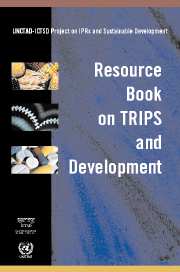Book contents
- Frontmatter
- Contents
- Preface
- Acknowledgments
- Explanatory note: the methodology
- List of acronyms
- PART 1 NATURE OF OBLIGATIONS, PRINCIPLES AND OBJECTIVES
- PART 2 SUBSTANTIVE OBLIGATIONS
- PART 3 INTELLECTUAL PROPERTY RIGHTS AND COMPETITION
- PART 4 ENFORCEMENT, MAINTENANCE AND ACQUISITION
- PART 5 INTERPRETATION AND DISPUTE SETTLEMENT AND PREVENTION
- PART 6 TRANSITIONAL AND INSTITUTIONAL ARRANGEMENTS
- Index
Preface
Published online by Cambridge University Press: 18 January 2010
- Frontmatter
- Contents
- Preface
- Acknowledgments
- Explanatory note: the methodology
- List of acronyms
- PART 1 NATURE OF OBLIGATIONS, PRINCIPLES AND OBJECTIVES
- PART 2 SUBSTANTIVE OBLIGATIONS
- PART 3 INTELLECTUAL PROPERTY RIGHTS AND COMPETITION
- PART 4 ENFORCEMENT, MAINTENANCE AND ACQUISITION
- PART 5 INTERPRETATION AND DISPUTE SETTLEMENT AND PREVENTION
- PART 6 TRANSITIONAL AND INSTITUTIONAL ARRANGEMENTS
- Index
Summary
Intellectual Property (IP) was until recently the domain of specialists and producers of Intellectual Property Rights (IPRs). The Agreement on Trade-Related Aspects of Intellectual Property Rights (the TRIPS Agreement) concluded during the Uruguay Round negotiations has in this regard signalled a major shift. The incorporation of IP into the multilateral trading system and its relationship with a wide area of key public policy issues has elicited great concern over its pervasive role in people's lives and in society in general. Developing country Members of the World Trade Organization (WTO) no longer have the policy options and flexibilities developed countries had in using IPRs to support their national development. But TRIPS is not the end of the story. Significant new developments have taken place at the international, regional and bilateral level that build on and strengthen the minimum TRIPS standards through the progressive harmonization of policies along standards of technologically advanced countries. The challenges ahead in designing and implementing IP-policy at the national and international levels are considerable.
This book has been conceived as a guide offering background and technical information on the TRIPS Agreement. It provides legal and economic analysis on each treaty provision with a view to identifying development-friendly policy options for the implementation of the Agreement.
- Type
- Chapter
- Information
- Resource Book on TRIPS and Development , pp. vii - viiiPublisher: Cambridge University PressPrint publication year: 2005



